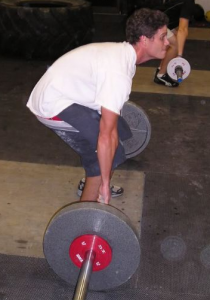Gray Cook is one of those professionals in the fitness industry that continually seems to challenge my understanding of things and get me thinking about the “why”. Why are we training what we’re training in the manner we’re training it? There ought to be a reason and you should know what it is. One topic that really stuck with me the first time I read it years ago is the idea that mobility should come before stability.
You’ll
often hear that we should be stable first and, until I was forced to actually
think about it, I would have agreed with this statement. It makes sense to want
to be stable, but in terms of order look at it this way: as an infant we are
super mobile and have to learn to stabilize all of that mobility in order to
crawl, then cruise, then walk. So while our bodies obviously develop and
change, taking some of this insane mobility with it, we should (barring injury)
still possess full range of joint motion.
Cook
laid it out as “mobility before stability and stability before movement”. So he
isn’t going against having stability early; he just adds the
prerequisite of mobility first. Certain strength exercises especially compound
lifts require adequate mobility to set up; once we start to perform said lift then stability is needed. To
set up properly for a deadlift you have to have the hip and ankle mobility to
get into the right position first. Without this you see compensations, which
sets people up for injury because they are starting a resisted movement from a
bad position mechanically.
 |
| If your hips lack mobility your body will find a way if forced to... even if it looks like this |
However, these types of compensations
apply to movements outside the weight room as well. Over-pronation of the foot is
not an uncommon compensation and can be the result of restricted ankle range of
motion. If ankle dorsiflexion (bringing the toes up toward the shin) is
restricted, the body compensates by pronating which is the combination of foot
eversion (foot rolling toward the big toe while lifting the lateral side), foot
abduction (foot turning out away from midline) and ankle dorsiflexion (toe
moving up toward the shin). The lack of proper ankle mobility causes the body
to compensate, which it will, to continue movement.
All
of this is to say that a proper exercise program should be training mobility,
stability, strength and power. However, order does matter and starting with
strength and power before adequate mobility and stability is a mistake that can
easily lead to dysfunction and injury. As one’s training age advances and
background adaptations, neuromuscular and connective, have improved along with
joint mobility and stability, then strength
and power can be consciously pursued.
-KO

No comments:
Post a Comment